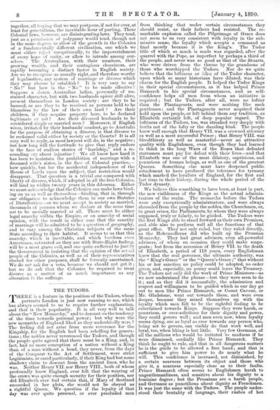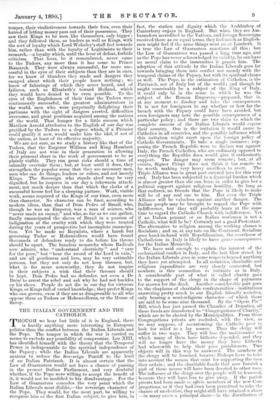THE TUDORS. T HERE is a feature in the position of
the Tudors, whose portraits London is just now running to see, which has always seemed to us to require further explanation, and that is their popularity. It is all very well to talk about the " New Monarchy," and to descant on the tendency of the time towards personal power ; but why were the new monarchs of England liked as they undoubtedly were ? The feeling did not arise from mere reverence for the Kingship, for the English had been rebelling for genera- tions ; the nobles never reverenced the Tudors, and though the people quite agreed that there must be a King, and, in fact, had no more conception of a nation without a King than of a man without a head, they never, from the days of the Conquest to the Act of Settlement, were strict Legitimists, or cared particularly, if their King had but some shadowy claim to descent from the ancient lines, who he was. Neither Henry VII. nor Henry VIII., both of whom profoundly knew England, ever felt that the wearing of the crown was quite enough security for their position, nor did Elizabeth ever feel certain that, if Mary of Scotland succeeded in her plots, she would not be obeyed as a rightful Queen. We question if the loyalty of that day was ever quite personal, or ever precluded men from thinking that under certain circumstances they should resist, as their fathers had resisted. The re- markable explosion called the Pilgrimage of Grace does not seem to us very consistent with loyalty in the sub- missive sense, the loyalty which accepts a command as final merely because it is the King's. The Tudor title of which so much is made was regarded, after the quarrel with the Pope, as imperfect by perhaps a third of the people, and never was so good as that of the Stuarts, who were driven from the throne by the grandsons of those who worshipped the Tudors. Nor do we quite believe that the loftiness or 1;13pic of the Tudor character, upon which so many historians have dilated, was their charm for the English people. It helped the Tudor Kings in their special circumstances, as it has helped Prince Bismarck in his special circumstances, and as self- confidence helps all men from whom an initiative is required ; but the Tudors, after all, were no loftiei than the Plantagenets, and were nothing like such gentlemen ; and the Plantagenets never acquired their hold upon the people, or left behind them any tradition, as Elizabeth certainly left, of deep popular regard. The loftiness of the Tudors, too, was streaked very deeply with faults not of the lofty or the dazzling kind. The people knew well enough that Henry VII. was a crowned attorney as well as a most successful Prince ; that Henry VIII. was bloodthirsty as well as masterful—never an attractive quality with Englishmen, even though they had learned to think in the long Wars of the Roses that defeated statesmen must pay for defeat with their lives—and that Elizabeth was one of the most dilatory, capricious, and penurious of human beings, as well as one of the greatest Queens. Something else must have deepened public attachment to have produced the tolerance for tyranny which marked the loyalists of England, for the first and last time in their history, during the whole period of the Tudor dynasty.
We believe this something to have been, at least in part, the new visibleness of the Kings as the actual adminis- trators of the realm. The monarchs before the Tudors were only exceptionally administrators, and were always shrouded from the people by the nobles, the Churchmen, or, in great crises, the Parliaments, by whom they were always supposed, truly or falsely, to be guided. The Tudors were the first Kings able to stand forward as their own Premiers, and able also to perform well all the functions of that great office. They not only ruled, but they ruled directly, as the Hohenzollerns did who built up the Prussian Monarchy. They had great advisers, even all-powerful advisers, of whom on occasion they could make scape- goats ; but from the accession of Henry VII. to the death of Elizabeth, a period of 118 years, every Englishman knew that the real governor, the ultimate authority, was the " King's Grace " or the " Queen's Grace ;" that without his or her sanction no policy could be adopted, no order given, and, especially, no penny could leave the Treasury. The Tudors not only did the work of Prime Ministers—as we now understand the phrase—but they were seen to do it ; and as they did it successfully, the admiration and respect and willingness to be guided which in our day go out to men like Prince Bismarck, or Count Cavour, or Mr. Gladstone, went out towards them, and were even deeper, because they mixed themselves up with the loyalty which men felt to be the rightful feeling to be entertained towards Kings. Suppose they were harsh, or penurious, or over-solicitous for their dignity and power, they could govern well ; and men even now, when loyalty seems dying, are as loyal as ever towards any person who, being set to govern, can visibly do that work well, and loyal, too, when liking is but little. Very few Germans, of all the millions who would be irritated to madness if he were dismissed, cordially like Prince Bismarck. They think he ought to rule, and that in all dangerous matters he is the guide to be allowed a free hand; and that is sufficient to give him power to do nearly what he will. This confidence is increased, not diminished, by a certain nearness between its object and those who give it, a nearness especially close as to their faults. Prince Bismarck often seems to Englishmen harsh to ungentlemanliness, and sensitive about his dignity to a feminine degree ; but the Prussians are a harsh people, and Germans as punctilious about dignity as Frenchmen. It was just the same with the Tudors. The people under- stood their brutality of language, their rushes of hot temper, their vindictiveness towards their foes, even their hatred of letting money pass out of their possession. -They saw their Kings to be men like themselves, only bigger ; and they followed them, as leaders as well as Kings, with the sort of loyalty which Lord Wolseley's staff feel towards him, rather than with the loyalty of Legitimists to their monarch,--a loyalty which, until the hour of defeat, forbids criticism. That hour, be it remembered, never came to the Tudors, any more than it has come to Prince Bismarck. They were always successful, far more suc- cessful in the eyes of their subjects than they are in ours, for we know of blunders they made and dangers they escaped about which their people knew nothing ; we know of falterings of which they never heard, and of failures, such as Elizabeth's toward Holland, which they would have denied to be even possible. To the eyes of the Englishmen of their time the Tudors were continuously successful, the greatest administrators in the world, men who were perpetually delighting their partisans with the sight of dangers averted, difficulties overcome, and great positions acquired among the nations of the world. That hunger for a little success which Matthew Arnold attributes to the English of our day was gratified by the Tudors to a degree which, if a Premier could gratify it now, would make him the idol, if not of the nation, at least of its effective majority. We are not sure, as we study a history like that of the Tudors, that the Emperor William and King Humbert of Italy are not wise in their generation in allowing their personal share in the work of government to be so plainly visible. They run great risks should a time of calamity overtake them ; but, at least until it does, they strengthen the popular sense that they are necessary men, men who can do things, leaders or rulers, and not merely Kings. The Sovereign who stands aloof may be very dignified, but he inspires in our day a lukewarm attach- ment, not much deeper than that which the clerks of a successful house feel for a sleeping partner. Work, visible work, seems required of the Kings of our time, even more than character. No character can be finer, according to modern ideas, than that of Dom Pedro of Brazil, who, though he was an Emperor, was a man of science, who " never made an enemy," and who, so far as we can gather, finally emancipated the slaves of Brazil in a passion of indignation at the cruelty with which they were treated during the years of prospective but incomplete emancipa- tion. Yet he made no Royalists, where a harsh but governing Tudor or Hohenzollern would have found thousands of defenders ready to die before his throne should be upset. The boneless monarchs whom Radicals now admire, who " understand electricity " and " care for the poor," but " bear the sword of the Lord in vain," and are all gentleness and love, may be very estimable persons, but they not only do not keep thrones, but, what is far more noteworthy, they do not inspire in their subjects a wish that their thrones should be kept. Dom Pedro had no defender, not even a De Breze to arrest the rebel and ask why he had not buckles on his shoes. People do not die in our day for virtuous Kings, or Kings full of varied knowledge ; they prefer Kings who can govern, even if they are as disagreeable to all who oppose them as Tudors or Hohenzollerns, or the House of Savoy.















































 Previous page
Previous page